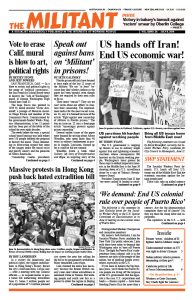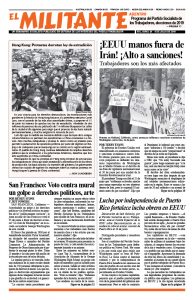Military forces and paramilitary thugs assaulted an encampment of thousands of protesters outside army headquarters in Sudan’s capital Khartoum in early June, killing over 120 people, wounding hundreds more and brutally dispersing the rest. The attack comes in response to ongoing mass actions throughout the country demanding the generals who took power after demonstrations ousted President Omar al-Bashir in April cede power to a civilian government.
“A description will never give you the whole truth,” Solomon Osama, a 27-year-old orthopedic surgeon who has been involved in the Sudanese protests for months, told the Financial Times. “It was a massacre.” Volunteers at medical tents stationed throughout the sit-in site told the media that when they tried to assist wounded protesters troops fired on them. Protesters captured by the military-backed thugs were severely beaten.
The deadly assault in Khartoum was led by the Rapid Support Forces, which was made an official part of the country’s armed forces in 2013. This paramilitary outfit, led by Lt. Gen. Mohamed Hamdan, was infamous for conducting genocidal killings to try and put down a popular rebellion in Sudan’s Darfur region in the 2000s. He is now second in command in Sudan’s new Transitional Military Council.
Sustained protests against the Bashir regime began in December in response to the tripling of bread prices, on top of years of hardships confronting millions of working people across this impoverished, war-ravaged country. Bashir, who had seized power in a coup 30 years earlier, sought to maintain his rule by brutal force coupled with promoting racial, national and religious differences to keep toilers divided.
As the current round of protests spread to dozens of cities nationwide, demonstrators chanted, “We are all Darfur,” meaning they would no longer allow the regime to divide them. When the army officer corps took control of the government April 11, they claimed it be “transitional” — for “just” two to three years.
Since the military assault protests have continued, led largely by the Sudanese Professionals Association. Actions include a rally June 13 in Omdurman, located on the opposite bank of the Nile to Khartoum, where protesters chanted slogans demanding a civilian government, pledging “a revolution forever.” There were also protests in the eastern city of Port Sudan.
At the same time the government’s crackdown continued. One attack in mid-June killed 17 people and burned more than 100 houses in the Deleij village in Darfur, the United Nations reported.
The military rulers in Egypt and the monarchies in Saudi Arabia and the United Emirates are backing the Sudan military council’s moves to consolidate power, pledging to provide them with $3 billion. Emirati-made armored vehicles patrol the streets of Khartoum. Washington sheds crocodile tears over the killing, but maintains cordial relations with the new “transitional” government.
Impact of neighborhood committees
After the Rapid Support Forces dismantled the protesters’ encampments in Khartoum June 3, the government imposed an internet blackout for “national security.” But neighborhood committees have sprung up in major cities, seeking to continue protests and solidarity actions.
As Rapid Support Forces soldiers patrolled central Khartoum June 8, some 300 protesters gathered in a neighborhood in Omdurman. Organized into four committees of 50 to 60 households, the community groups “are working to sustain the resistance by passing information, providing financial support to those families in most need and building barricades on neighborhood streets,” the Financial Times reported.
“During the protests you find safety in somebody’s house, you meet people from your neighborhood you never knew,” mental health worker Sulaima Ishaq Sharif told the paper.
The leader of the military council, Lt. Gen. Abdel Fattah al-Burhan, called for protest leaders to re-enter negotiations, saying he now projects holding presidential elections in no more than nine months. Protesters have refused, saying there will be no talks as long as the military refuses to give up power.

